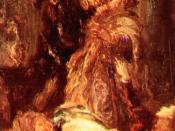Our modern understanding of tragedy and tragic heroes is derived from the writings of the Ancient Greek philosopher, Aristotle in his famous "poetics". Although Aristotle considered Sophocles' Oedipus to be the ideal tragic hero, Shakespeare's Hamlet, written many centuries later, has many of the same elements.
Aristotle defined the tragic hero as an honourable protagonist with a fatal flaw or "harmartia" which eventually leads to his demise. The audience must develop an emotional attachment to the hero because he has admirable qualities, the audience must fear what will happen to the hero and after the misfortune they must feel intense pity for him. The combination of fear and pity results in "catharsis."Hamlet is a complex character. He is intelligent and a deep thinker supported by the fact that he is a university student. He is brave and loyal and loving to his father's memory. In addition he is a prince.
These traits allow the audience to like him. In his first soliloquy (Act, 1 Scene 2) Hamlet shares with the audience his despair and grief at his father's death and his mother's quick remarriage "Oh most wicked speed to post with such dexterity to incestuous sheets". However his thinking becomes obsessive and he cannot seem to accept the situation. He says, bitterly, to his friend Horatio, "The funeral baked meats did coldly furnish forth the marriage tables." At the end of his third soliloquy (Act 3, Scene 1) he realises that he has forgotten about the deed he is meant to carry out because he has been thinking too deeply about other issues. "Thus conscience does make cowards of us all" Hamlet is aware of his flaw and although he wants to avenge his father's death he does not seem able to act. Fortinbras and Laertes actions are in...


